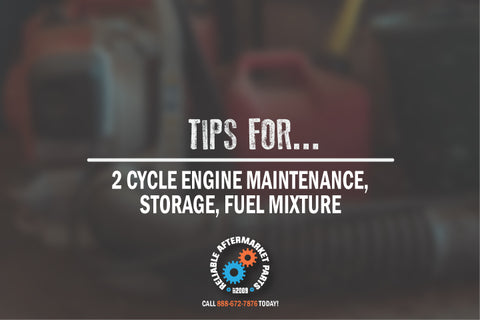2 Stroke Cycle Engine maintenance, storage, fuel mixture
You're probably someone who likes to maintain your own gear and motors throughout the home. This should be no different when it comes to handling the maintenance and storage of a two-cycle engine. These types of engines are found primarily within lawn mowers and, with proper care, will work well for quite some time.
How often should I perform maintenance?
There's no exact number, but a good idea is after the season is done. That means it's gone through enough usage, and now it's about cleaning everything out and preparing it for storage. That means you want to drain out the oil and the gasoline and keep it empty until you end up using it for the next season.
If you're using your equipment more extensively during the season, then make sure you change the oil a few times during the season and use only the highest quality oils that work with air cooling engines.
When it comes to the fuel mixture, you want to make sure you don't use anything too strong and that the alcohol content is capped at 10%. If you want the fuel to last even longer, always consider adding some fuel stabilizer.
Don’t forget to do a routine maintenance check
Another key area to maintain is the spark plug itself. Without this, your engine won't go on at all. That means taking care of your spark plug and having it look as good as new every time. It's not that costly, so you may simply just consider replacing it every few seasons to keep everything running smoothly.
Then you're going to need to be checking out all the nuts and bolts that hold everything together. These machines handle a lot of vibrations and extensive wear and tear that could potentially loosen everything. If you don't check those areas and tighten or replace the nuts and bolts as needed, you might have something flying off when you turn it on next.
Clean everything
If you want your engine to run well, you want it to run efficiently and not be overworked, and that means having everything properly cleaned. From the air filters to the underlying cutting area.
Anything that is clogged up or backed up will have the engine working overtime and possibly overheating. That will cause wear and tear on all the components, including the motor belt. Check the exhaust as well to make sure that it’s clean.
Always consider safety
Whenever you're handling any type of replacement of liquids or 2-cycle engine maintenance, make sure that everything is turned off. You'll also want to wear protective gear, even if it's as simple as replacing the oil, as you don't need to get that all over your skin. Practicing a safety-first mentality will help go a long way with all of your DIY maintenance needs.
When you're done for the season, ensure that everything is stored in a cool and dry place as you don't want the moisture to seep in and cause unnecessary decay and corrosion to your engine.






